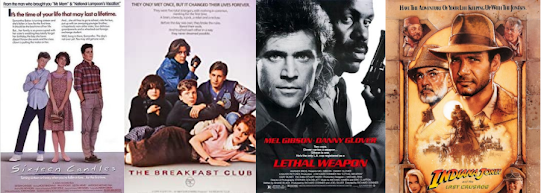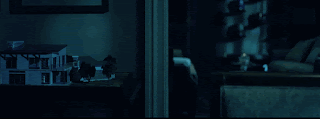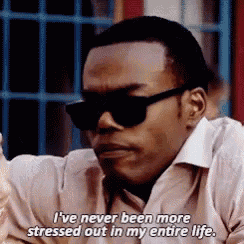I had never heard this word before I started working on my PhD. Then it became my favorite word. I overused it all the time, applied it to every situation I could. It sounded smart to me. It was my go-to word for years. Then I saw someone write that problematic was just white scholars' way of continuing to like what they wanted even if it was racist or misogynist or sexist or otherwise bad. And I felt that.
Since I've been working on this edited collection that deals with why we reboot, remake, revisit, and reimagine horror films, and how the answer is tied to both trauma and nostalgia studies, I've been thinking a lot about what we get out of these revisitings. Why do we return again and again to things? In turn I've also been thinking of all the things I can no longer revisit or do not revisit because I know they have deep issues and I don't want to taint my original memory of a thing. Growing up I loved Sixteen Candles, The Breakfast Club, the Indiana Jones films, the Lethal Weapon movies. These movies though are not "problematic" they're rapey, racist, present white colonial narratives, feature bigot anti-Semites. I cannot watch them anymore no matter how much I once liked and loved them. I struggle to watch Buffy the Vampire Slayer in light of reports of sexist behavior. I won't watch anything with Johnny Depp in them. Firefly has been ruined by Adam Baldwin's bigoted rants. But me losing things I once liked is nothing compared to decades and decades of celebrating racist, sexist, bigoted, predominantly white narratives. It's not problematic it is wrong. And there is just no way to get around that.
Over the holidays there were movies released online and I saw a flurry of several different threads appear on Twitter. One bemoaned fact that straight to online, skipping the theatre, movies meant people didn't respect etiquette of not spoiling films. Assuming everyone had access and therefore was watching immediately. Another talked about how if a person liked a thing and you didn't there was no reason to shit on the thing they liked. Yet another took a couple of the films that came out and laid out step by step how awful they were, for racism, classism, digital blackface, rapey storylines, non-consent, sexism, misogyny, poor portrayals of women. Maybe once, before Twitter and other social media, I could have watched a thing and liked it or not, perhaps changing my mind as I thought about things more. But now, when I read what people write about how a movie erases their identity, hurts them, continues harmful practices, I can't ignore it or pretend like it doesn't matter, or that somehow my enjoyment of a thing is more important than the hurt a thing causes.
It's a situation teachers face all the time. Too often teachers and professors dismiss the hurt of others, their students, their parents, other teachers, and do so in such a way that weaponizes their intellect. The teacher is knowledgeable, those others are not. The teacher represents a higher intellectual authority and must be listened to. The hurt of certain novels, portrayals, and teaching is ignored, dismissed, in order to continue the status quo. One of my most shameful memories is when I was a younger teacher and a Black parent told me that they did not appreciate their child having to say and hear the n-word as my class read To Kill a Mockingbird out loud. At the time I listened to the parent but dismissed them, claiming it was required reading, a classic. It was years before I listened and faced the horrible harm I'd done to so many students in my class. The canon gets used a lot in teaching as a way to say "screw you" to people. To tell whole groups of students that their narrative, or their discomfort and trauma caused by other narratives, does not matter. Labelling something "problematic" is used in similar ways. It is used to state that you know something is wrong and you don't care. It's not that movies from the 80s did not know that rape or racist stereotypes were bad. It's that they didn't care. It's not that people didn't know that X actor was an abuser. It that people did not care.
For too many fans and scholars it feels like once they label something problematic they are done and no longer have to deal with the issues in the text. They did their job, they paid lip service, but there is no onus to not teach it. Or teach it in such a way as to call out the racism, sexism, bigotry, anti-Semitism. Or teach an alternate novel or work and only mention the other text AS a racist, sexist text.
In k-12 I've come to believe that there is no reason to teach the canon. I think if we ask ourselves what we want these foundational years to do the answer is to teach students to read and analyze and critically think about what they read. To learn to explore places, people, religions and cultures they might not know otherwise, but also to teach texts that show them their own narratives, and accurate portrayals of our country and its history.
When you get to college I'm of a similar mind. I think in most cases there are few pedagogical reasons to teach an unexamined canon. I think in many surveys teaching narratives students haven't been exposed to, or novels that aren't the one book from that one author everyone knows, are more valuable. I think using courses to correct or balance hundreds of years of biased, white narratives is important.
A common argument in the canon wars is no one is telling you that you can't still read X. And that's certainly true. I would ask though why are you? What are you trying to accomplish? What do you want your students to get out of it? How does it fit in the goals of the class? Of your students? I wish more professors thought about what their pedagogical reasons were were teaching certain texts and scholars, to consider the harm they may be doing to their students in teaching certain texts and scholars, and rethink their approaches.
On Twitter the other day someone asked how many classes people had taught in their careers. As I tried to do the math in my head, I realized that while I have taught lots of British Literature I surveys, and Shakespeare classes, and Composition I and II classes, I have never taught the same class. Not when I taught English 9-12 or AP Literature and Language, and not now. First, I've never understood how people teach the same thing every semester, every year, year after year, for decades, because my students are different each semester. I think differently about topics and scholars each semester. The world changes, new texts come out, new technologies.
I think if folks are dead set on teaching On the Road (a book I once loved), For Whom the Bell Tolls, The Adventures of Huck Finn, I think it's important to be explicit about why you are. I think you need to explain why you chose this book to your students. You have to face all the issues in these books. And have honest conversations about those issues. I think you need to particularly use scholars and specific work to highlight responses to these works in the time since they were published.
These conversations can be transformative, and are not limited to that class or even discipline. I am a medievalist and early modernist who works in folklore and popular culture. Yet the classes that most shaped who I am as a scholar were classes on the American West, Chican@ Films, and Southwest Folklore. These classes introduced me to the idea of resituating The Last of the Mohicans as a the first frontier novel. They taught me about films and scholars that centered Indigenous and Chican@ narratives and called out the issues with Anglo directors, writers, structures, telling these stories. They introduced me to interdisciplinary studies, the value of readng across periodizations, and changing perspectives. It was these professors who had the most impact on me and the work I do. They taught me to ask questions, to "problematize" what I'd been taught, and provided models for my own work.
I would love to teach a class on the American West. Starting with The Last of the Mohicans as the first frontier novel, how it and our concept of what the West was is a microcosm for so many of our societal ills. Our privileging of certain narratives, the erasure of cultures, how this erasure, chaacterizing them as less than human was only to enable expansion at any costs. How these brutal, violent events get romanticized and revised almost immediately. How these stories that children grew up on enable them to provide these same views to anyone they encounter, in their communities, media portrayals, global politics. How modern adaptations use these viewpoints and the romanticization to justify continued stereotypical, racist, sexist portrayals. All while connecting to historical events, introduce them to the narratives they DON'T know. That's a class that I think would work. A class with no easy answers. I'd enjoy that. But it wouldn't mean I'd call The Last of the Mohicans "problematic." I would not frame my enjoyment of anything at the expense of others. None of us should.

































